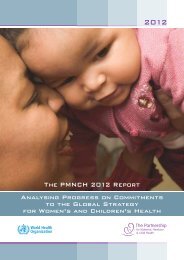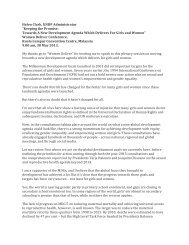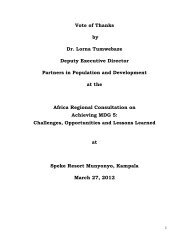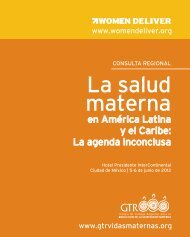tRicardo and Sarain Mexico City saythey have decided towait until they finishschool and find jobsbefore they marryand have children.©<strong>UNFPA</strong>/RicardoRamirez Arriolaelderly, as was documented in another studyfrom Matlab, Bangladesh (Chaudhuri, 2005;Chaudhuri, 2009).Family planning and the well-being <strong>of</strong>boys and menThe impact <strong>of</strong> family planning on men’s physicalhealth is likely not significant. However, delayingand preventing unintended pregnancies andbirths can have an impact on their schooling andemployment opportunities (Montgomery, 1996).Where a man is obliged to take responsibilityfor a woman’s pregnancy, he may be forced toleave school (though without facing the samesocial stigma a woman would) in order to workand support the woman. Like most mothers, aresponsible father may have to give up opportunitiesfor lucrative employment, accept jobs thatare less than ideal, and give up opportunities forcareer growth and development.Outside or within marriage, an unintendedpregnancy can have an effect on the mentalhealth <strong>of</strong> both parents, particularly whenpartners differ in their commitment towards apregnancy (Leathers and Kelley, 2000). Evidenceindicates that the incidence <strong>of</strong> depression, physicalabuse, and other mental health problems areall higher among those who experience unintendedpregnancies than where pregnancies areintended. These issues affect not only the menand women concerned, but their children andfamilies (Korenman et al., 2002).Evidence also suggests that unwantedpregnancies are <strong>of</strong>ten associated with higherlevels <strong>of</strong> marital dissolution, lower householdincomes, and a variety <strong>of</strong> negative psychosocialeffects on child-development (McLanahan andSandefur, 1994).Health, demographic change, thewealth <strong>of</strong> nations and sustainabledevelopmentThe impact <strong>of</strong> improved sexual and reproductivehealth, including family planning, and82 CHAPTER:4: THE SOCIAL AND ECONOMIC IMPACT OF FAMILY PLANNING
gender equality is much stronger and moredirect at the household level than the microeconomiclevel or the macroeconomic level.But the individual and household impacts<strong>of</strong> family planning services—lower fertility,improved health, decreased mortality, greaterinvestment in human capital, greater participationin the labour force and increasedincome and savings—also scale up at the moreaggregate levels <strong>of</strong> communities and countries.These macro-level effects are sometimes difficultto identify because these variables areinterrelated and are influenced by an enormousnumber <strong>of</strong> additional variables such asthe institutional environment, the influence <strong>of</strong>policy, wars and other major social, economicand political events. Though conclusive evidence<strong>of</strong> the magnitude <strong>of</strong> the relationshipsdoes not yet exist, some areas <strong>of</strong> consensushave emerged.One such area <strong>of</strong> consensus among economists,demographers and policymakers isrecognition <strong>of</strong> the role <strong>of</strong> population age structuresin economic development. Declines infertility initially reduce the share <strong>of</strong> a country’spopulation that is young. For some time, theinitial decline in the youth population that isdependent others for their basic needs is not<strong>of</strong>fset by increases in the share <strong>of</strong> the populationthat is older and dependent on others. Atthis point in the demographic transition, therelative size <strong>of</strong> a country’s working-age populationincreases. This one-time increase in theproportion <strong>of</strong> the working-age population thatcoincides with a one-time decrease in “dependencyratios” creates favorable conditionsfor economic development and is called the“demographic dividend.”At the macroeconomic level, the demographictransition reduces a number <strong>of</strong> challengesin countries that cannot easily keep up withinvesting in health and education <strong>of</strong> a large andrapidly growing youth population, and managingan essentially unlimited supply <strong>of</strong> labour.The demographic dividend also provides countrieswith opportunities to increase labour forceparticipation, income, saving, investment, andsocial change, if policies are in place to investin the human capital <strong>of</strong> this young group (viahigher per-capita spending on health andeducation, greater investment in physicalinfrastructure and institutional development,and support for civic participation, amongother things).“After fertility rates steadily decline over the course <strong>of</strong>20 or 30 years, the number <strong>of</strong> income-generating adultsgrows relative to the number people who depend on themfor support, thus creating more favourable conditions foreconomic growth and sustainable development.”Demographic dividends have been observedin East and Southeast Asia, Latin America, theMiddle East and North Africa, and the PacificIslands (Lee et al., 2010; Lee, 2003; Lee et al.,2001; Mason and Lee, 2004; Lee and Mason,2006; Bloom et al., 2009; Schultz, 2009). Thedividend began in East Asia in the 1970s, inSouth Asia in the 1980s and in sub-SaharanAfrica in the new millennium.Macro-level impact <strong>of</strong> family planning onsavings, investment and growthDependency ratios and the demographicdividend can affect economies and societies innumerous ways. In early stages <strong>of</strong> the demographictransition—when the share <strong>of</strong> thepopulation that is young starts to grow—countriesmay be required to spend more on schools,health clinics, housing, and other infrastructureTHE STATE OF WORLD POPULATION <strong>2012</strong>83
- Page 6 and 7:
OverviewOne hundred seventy-nine go
- Page 8 and 9:
The report is structured to answer
- Page 10 and 11:
viiiCHAPTER 1: THE RIGHT TO FAMILY
- Page 12 and 13:
“All human beings are born free a
- Page 14 and 15:
Treaties, conventions and agreement
- Page 16 and 17:
Health: a social and economic right
- Page 18:
“Everyone has the right to educat
- Page 21 and 22:
designing and delivering accessible
- Page 23 and 24:
use, and reduces unintended pregnan
- Page 26 and 27:
16 CHAPTER 2: ANALYSING DATA AND TR
- Page 28 and 29:
Change in Age-Specific Fertility Ra
- Page 30 and 31:
Sexuality, sexual and gender stereo
- Page 32 and 33:
not necessarily associated with a d
- Page 34 and 35:
METHOD EFFECTIVENESSMethod, rankedf
- Page 36 and 37:
tCouple visiting a ruralfamily plan
- Page 38:
Demand and supply over time5 per ce
- Page 41 and 42: contribute to high unmet need (Sing
- Page 43 and 44: abortions in the region lead to mor
- Page 45 and 46: (as stated in the Convention on the
- Page 47 and 48: arriers prevent individuals from ac
- Page 49 and 50: CHAPTERTHREEChallenges in extending
- Page 51 and 52: sources of sexual and reproductive
- Page 53 and 54: messages were delivered via a numbe
- Page 55 and 56: Ricardo, 2005). Moreover, young and
- Page 58 and 59: per cent in Guatemala. Across all c
- Page 60 and 61: tTeenager inMadagascar listens toa
- Page 62 and 63: Consensual unions account for an in
- Page 64 and 65: when. The proportion of never-marri
- Page 66 and 67: 63 per cent to 93 per cent of young
- Page 68 and 69: Family planning in humanitariansett
- Page 71 and 72: Studies suggest that HIV may have a
- Page 73 and 74: with a public health challenge (Wor
- Page 75 and 76: State-run family planning programme
- Page 77 and 78: people in mobile, temporary, and re
- Page 79 and 80: systems and civic participation to
- Page 81 and 82: CHAPTERFOURThe social and economici
- Page 83 and 84: tCommunityeducation inCaracas, Vene
- Page 85 and 86: Estimates of Total Fertility2010-20
- Page 87 and 88: children, and healthier women also
- Page 89 and 90: empirical evidence supporting this
- Page 94 and 95: to secure the future population’s
- Page 96 and 97: 86 CHAPTER 5: THE COSTS AND SAVINGS
- Page 98 and 99: Unintended Pregnancies and outcomes
- Page 100 and 101: tDonor Commitmentspanel at the Lond
- Page 102 and 103: UNFPA supports the Health for All c
- Page 104 and 105: tDr. BabatundeOsotimehin, Executive
- Page 106 and 107: 96 CHAPTER 6: MAKING THE RIGHT TO F
- Page 108 and 109: When individuals are able to exerci
- Page 110 and 111: Family planning programmes must ref
- Page 112 and 113: Family planning programmes reinforc
- Page 114: tPresident of NigeriaGoodluck Jonat
- Page 117 and 118: Monitoring Monitoring ICPD ICPD Goa
- Page 119 and 120: Monitoring Monitoring ICPD ICPD Goa
- Page 121 and 122: Monitoring Monitoring ICPD ICPD Goa
- Page 123 and 124: Monitoring ICPD Goals Demographic -
- Page 125 and 126: Monitoring ICPD Goals - Selected In
- Page 127 and 128: BibliographyAbbasi-Shavazi, Mohamma
- Page 129 and 130: Monitoring ICPD Goals - Selected In
- Page 131 and 132: Monitoring ICPD Goals - Selected In
- Page 133 and 134: Monitoring ICPD Goals - Selected In
- Page 135 and 136: Monitoring ICPD Goals - Selected In
- Page 137 and 138: Monitoring ICPD Goals - Selected In
- Page 140: Delivering a world where every preg
















